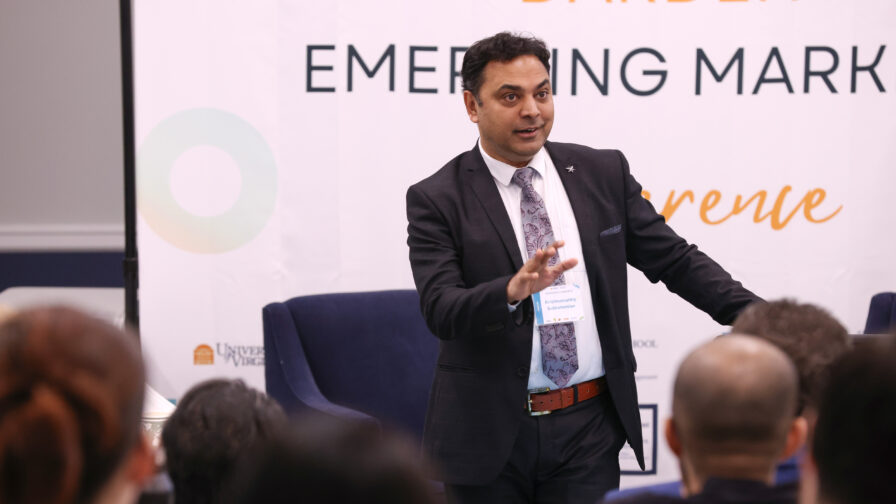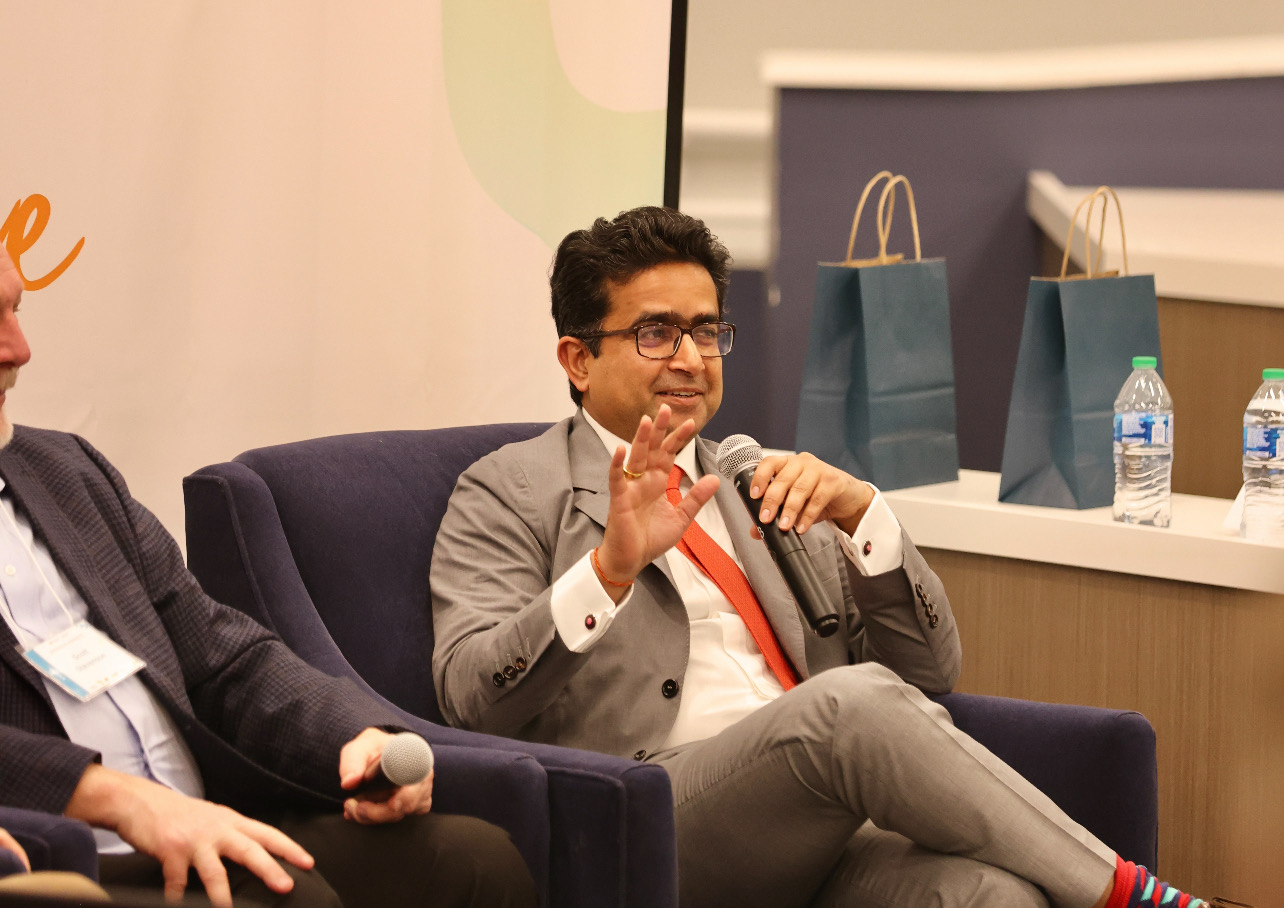
Emerging Markets Conference: Incredible Growth, Differing Definitions and Doing Good
By Dave Hendrick
Although typically considered an emerging market on the global stage, rapidly expanding India may be poised for even more eye-popping growth.
Keynoting the Emerging Markets Conference at the University of Virginia Darden School of Business, Krishnamurthy Subramanian, an executive director of the International Monetary Fund and former chief economic adviser to the prime minister of India, outlined his case for rapid growth of India, which he said could be a $55 trillion economy by 2047.
Subramanian, who rose to renown by predicting and then helping to actualize a V-shaped economic recovery amid the initial shocks of the COVID-19 pandemic, admitted his forecast called for a sustained level of growth that exceeded most other mainstream prognostication, noting that EY called for India to be a $26 trillion economy in 2047, while Goldman Sachs predicts India will reach the $52 trillion mark in 2075.
“So, given these predictions, you’ll actually wonder is this guy out of his mind? Is he nuts?” asked Subramanian.
The economist said his “ambitious but achievable” forecast calls for the $55 trillion total to be hit following economic growth of roughly 8 percent annually. The figure is buoyed by a projected slowing in the depreciation of the Indian currency — a projection often overlooked by other predictors, he said — related to India inflation targets of 4 percent, as well as significant increases in productivity in India stemming from investments in infrastructure and formalization of the Indian economy.
“Starting from 2021 onward, the Indian government has started investing significantly more, especially in infrastructure,” said Subramanian. “When infrastructure is created, private investment follows.”
Additionally, India is benefiting from rapid digitization and the growth of e-commerce, telecom and banking services throughout the population.
“India has built this digital infrastructure as a public good,” Subramanian said. “This is what can lead to sustainable and inclusive growth in the economy.”
For example, the sidewalk clothing hawker now has proof of a history of payments, Subramanian said, potentially tapping into a “transformative” line of credit from a lending institution.
Subramanian, whose forthcoming book, India@100: Envisioning Tomorrow’s Economic Powerhouse, will be published later this year, also encouraged Darden graduates to consider starting or continuing their careers in India. In addition to the opportunities throughout the economy, in a world in which salary increases are “very closely tied to the nominal rate of growth of the economy,” India offers a strong potential return on the investment of their human capital.
ESG Commitments Amid Fear of ‘Greenwashing’

Manoj Sinha (MBA ’09) is the cofounder and CEO of Husk Power Systems.
The rapid developments in emerging markets as well as the many varied application of ESG principles were themes throughout the day on panels focused on technology, finance, economics and electric vehicles, among other topics. The conference, titled “Social Pioneers Among Global Challengers: The ESG Agenda in Emerging Markets,” is an entirely student-run conference, co-hosted by multiple student organizations, including the Latin American Student Association, the Darden African Business Organization, the Asia Business Club @ Darden, the Darden South Asia Society, and the Adam Smith Society, among other groups.
At an afternoon panel on finance in emerging markets, Manoj Sinha (MBA ’09), cofounder and CEO of Husk Power Systems, said that while he saw significant success attracting investment and raising money for expansion in 2023, fundraising in the broader green energy sector had grown increasingly difficult, “primarily because of greenwashing.”
Various green energy projects relying on carbon pricing have been accused of being of questionable value, leading to some pullback in the space.
“Greenwashing petrifies banks at the moment,” said Sinha, who was recently named to the list of the 100 most influential climate leaders in business by Time.
Husk, which builds and operates community renewable mini grids, also supplies reliable electricity and sustainable products and services to rural and peri-urban customers.
The company receives a premium on the price of its carbon because it can show the real assets and data offsetting carbon emissions. The company, which raised more than $100 million in debt and equity in a late 2023 deal, has more than 200 minigrids in India and Nigeria and has announced plans for 2,500 minigrids in Africa.
Thuledu Ntshingila, a portfolio manager for the Development Bank of Southern Africa, said measuring the impact of a supposedly green or climate friendly projects is often difficult due to a lack of standardization on ESG metrics.
“There’s not a clear definition of standards,” said Ntshingila. “We need to have stricter regulatory oversight and develop a standard definition of what is sustainability, what does it look like and what are the metrics.”
In her view, for a project to be truly sustainable, it needs to leave the community better off, Ntshingila said, a measure that can be difficult to equate to standardized metrics.
Scott Stevenson, senior vice president of the Bankers Association for Finance and Trade, agreed that ESG would remain an overly broad concept until greater adoption of common standards and metrics.
“The need for accepted global frameworks for what constitutes ESG is really important,” said Stevenson, who added to the students in the room: “It’s going to fall on you to drive that.”
The University of Virginia Darden School of Business prepares responsible global leaders through unparalleled transformational learning experiences. Darden’s graduate degree programs (MBA, MSBA and Ph.D.) and Executive Education & Lifelong Learning programs offered by the Darden School Foundation set the stage for a lifetime of career advancement and impact. Darden’s top-ranked faculty, renowned for teaching excellence, inspires and shapes modern business leadership worldwide through research, thought leadership and business publishing. Darden has Grounds in Charlottesville, Virginia, and the Washington, D.C., area and a global community that includes 18,000 alumni in 90 countries. Darden was established in 1955 at the University of Virginia, a top public university founded by Thomas Jefferson in 1819 in Charlottesville, Virginia.
Press Contact
Molly Mitchell
Senior Associate Director, Editorial and Media Relations
Darden School of Business
University of Virginia
MitchellM@darden.virginia.edu




